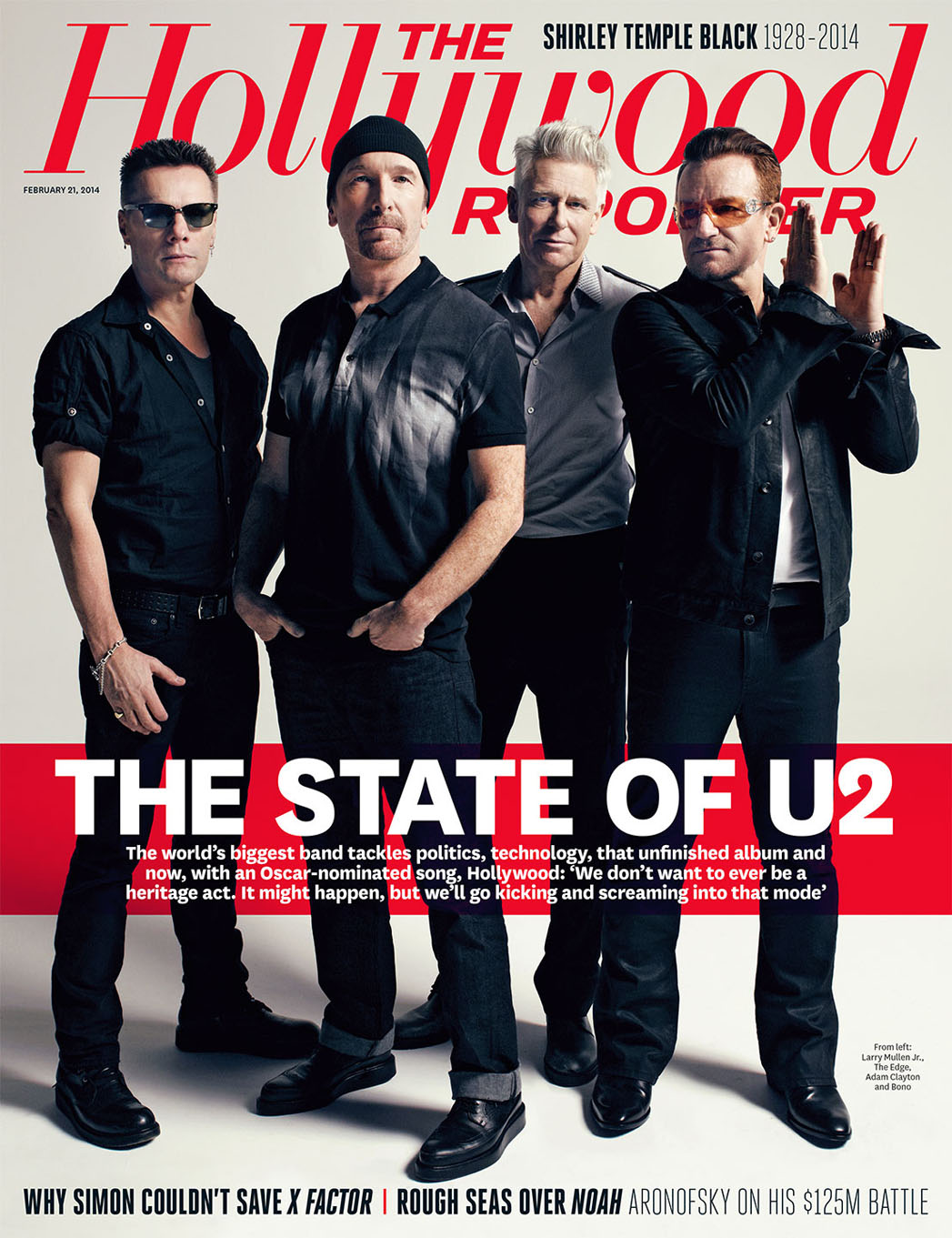The world’s biggest band tackles politics, technology and now, with an Oscar-nominated song, Hollywood: “We don’t want to ever be a heritage act. It might happen, but we’ll go kicking and screaming into that mode.”
Just after Finnegan’s pub opens at noon on a blustery, rainy, intermittently sunny winter day in Dalkey, a seaside suburb south of Dublin, Bono slides in the door and settles into a corner booth with his back to the wall and a wide-angle view of the establishment, like a wary gunfighter who wants to see what’s coming. In a hoarse whisper, he orders tea and a plate of smoked salmon. His unimmaculate red-tinged quiff and tired eyes seem to be telling me this is a man who recently rolled out of bed.
The 53-year-old lead singer of the perennially biggest rock band in the world is quick-witted and preternaturally eloquent, but he also is one of the most interviewed humans on the planet, and he has a stash of well-rehearsed riffs that, understandably, tend to play on repeat. Once his throat is soothed by the tea and he’s fully awake, however, I’m pleased to discover that the man loves to talk movies and has fresh things to say about them, ranging from Scorsese and Hitchcock to Wenders and Tarantino.
Unlike your average cinephile, of course, Bono is, along with his band U2, an Academy Award nominee for best original song — “Ordinary Love,” a bittersweet anthem that plays as the coda to Mandela: Long Walk to Freedom. It’s the group’s second nomination, after “The Hands That Built America” from Gangs of New York in 2003, and they’ll be at the Oscars on March 2 to perform the song.
The gift of a nomination arrives as U2’s latest reinvention is just ramping up, with a new album and tour looming. This time around, the challenges facing a band that won’t settle for anything less than owning the future might be more dire than at any time since the early 1990s, when Achtung Baby and the avant-techno Zoo TV tour saved U2 from irrelevance and cemented its world domination as a cultural force. Not unlike a hungry startup, U2 is pursuing business alliances as well as brainstorming music packaging and distribution innovation like its life depends on it.
Figuring out a new identity also is a theme that emerges in our conversation, as we range from Mandela and the marathon work on U2’s next album, still ongoing with a tentative release date of this summer, to the early influences on the band’s identity and worldview.
“I’ve been thinking a lot about this because of the new album,” says Bono. “I was drawn in by movies that fashion you and make you who you are.” He also has been revisiting music that fired U2’s first visions of new possibilities (Joy Division, Kraftwerk, the Ramones) and the DIY fan enthusiasm that made them pick up instruments and launch Feedback, as U2 briefly called itself in the very beginning.
“I don’t want to grow out of that,” says Bono (real name: Paul David Hewson). “We consider ourselves to have been the people who stepped out of the audience at those early punk rock shows onto the stage. There was no ‘them’; it was only ‘us.’ We actually took it out of the audience and onto the stage before we could quite play.”
“There is no them / There’s only us” — it’s a talismanic phrase that not only reflects U2’s founding ethic but the implications of the band’s name and its decades-long engagement with conflict and injustice, from Ireland and Nicaragua to Ethiopia, Somalia and South Africa. (It also happens to be the final chorus of the single “Invisible,” U2’s follow-up to “Ordinary Love” and the first hint of where the forthcoming album is heading.) Given U2’s close relationship with the first black leader of South Africa, which evolved from the political to the warmly personal, you sense that winning this particular Oscar would be a vindication far beyond a career accolade.
When I bring up the Academy Awards, Bono enthuses about the other category nominees and the stiff competition, saying he’s been urging the band to lower any expectations of winning. But “if the song gets to shake the hand of the little gopher,” he says, “it would give a whole other imprimatur to our audience, which would be great. I would love if it had a life outside of the film. Because we poured so much of our life into the song and, I hope, his life, the life of Mandela.”
Continue reading on The Hollywood Reporter
Latest posts by voxx (see all)
- Audio – March 2, 2024 – Las Vegas, NV – Sphere - March 2, 2024
- March 1, 2024 – Las Vegas, NV – Sphere - March 1, 2024
- February 24, 2024 – Las Vegas, NV – Sphere - February 24, 2024




